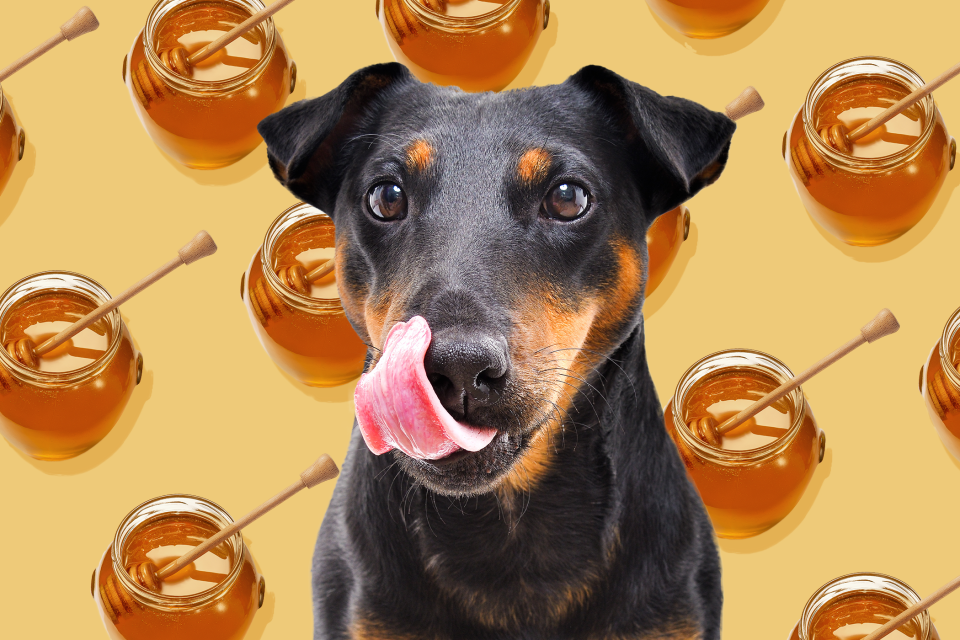Can Dogs Eat Honey? Here's What a Vet Recommends
Dotdash Meredith and Yahoo Inc. may earn commission or revenue on some items through the links below.
Regarding this tasty nectar, maybe the beloved literary icon Winnie the Pooh said it best: "My favorite thing is me coming to visit you, and then you ask, 'How about a small smackerel of honey?'" Might your pooch woof the same? We asked a veterinarian for insight on whether dogs can eat honey safely and other essential health pointers about this sweet treat.

kovaleva_ka / sonsedskaya / Adobe Stock
Can Dogs Have Honey?
Well, they can, but why, how much, and in what forms really matter.
Dogs are omnivores, which means they enjoy both meat and plants. Their teeth and digestive systems are even designed to chomp and process plant material, too, which is why it's okay to occasionally give your pup some 'people food' such as carrots or apple slices.
RELATED: What Can Dogs Eat?
Kristin Wuellner, DVM, is with Hill's Pet Nutrition. She tells Daily Paws that dogs can safely eat raw honey in small quantities. Raw honey is only strained to remove bee and beeswax particles before bottling, keeping essential antioxidants and enzymes intact. Commercial honey goes through pasteurization and ultra-filtering for color and clarity. These manufacturing processes might remove those benefits or introduce unnecessary additives.
Veterinarians recommend our favorite doggos get 10 percent or less of their daily calories from treats, as a well-balanced diet meets all their nutritional requirements. Since honey for dogs isn't a staple, Wuellner says it's important to not overdo it. "A dog typically shouldn't consume more than a teaspoon of honey a day, but that amount can be less based on the size, breed, and age of your dog. Avoid giving them too much and causing digestive upset."
You might also evaluate why your canine friend actually needs it. No offense to Pooh, but a smackerel of honey is unlikely to prompt tremendous chop licking and "Gimme!" snuffs like a succulent nibble of turkey or a spoonful of peanut butter. So Wuellner advises first consulting your veterinarian if you're considering adding honey consistently to your dog's diet.
Is Honey Good for Dogs?
As long as you're not emptying the squeezy bear all over the kibble, there are some potential scenarios when honey is safe for dogs.
Wuellner says raw honey has excellent natural antibacterial and anti-inflammatory properties. "This means it can be very helpful in wound healing. If your pup ever has an open wound or injury, your veterinarian may consider using clinical-grade honey to help expedite the wound healing process," she adds. If you want to really deep-dive into this concept, there's even an extensive study that compares clinical-grade honey and Manuka honey for dogs' wound treatment and warding off infection. It's also sometimes helpful for comforting and healing dry skin and hot spots.
Of course, topical applications mean poor poochie will have to sport the cone of shame for a while to let honey work its magic and not lick it away!
There are other possible health advantages. "Raw honey is believed to have several anecdotal health benefits, from minimizing seasonal allergies to soothing a sore throat, and more," Wuellner says. Some veterinarians have even used it to ease kennel cough. Again, she recommends that before you attempt to build up a tolerance to pollen or soothe a sore throat, it's best to discuss a complete medical plan with your veterinarian.
Dogs Who Should Avoid Eating Honey
Certain pups have health conditions that require close dietary monitoring, so those on the 'no list' include:
Dogs with diabetes or obesity. "Honey should be avoided in diabetic or obese dogs due to its high sugar content," Wuellner says. Follow your vet's nutritional guidelines for better snacks. (Probably broccoli. Ick.)
Puppies. Young pups under two years old as well as dogs with compromised immune systems shouldn't be fed raw honey, as Wuellner says it might contain botulism spores, a bacteria that makes the botulinum toxin that can cause paralysis.
Dogs allergic to bee stings. Keep in mind that canines don't often have this reaction. True food allergies are even more uncommon, and more related to certain proteins, such as eggs. Additionally, BeeAware indicates that a honey allergy is extremely rare, even for humans.
Can Dogs Eat Honey In Treats?
Yes, but a healthy, active pooch doesn't need the whole honey pot! Try a few munchies with a hint of fruit or honey—and of course, plenty of extra rewarding pats. Here are some vet-approved suggestions:
Packaged:
Homemade:
Oh, and to answer that burning question, can dogs eat Honey Nut Cheerios—well, they'll probably find them on the floor before your robot vacuum does! While a few won't hurt them if this happens, the cereal has other ingredients that aren't part of a well-balanced canine diet, so it's best to stick with treats specifically formulated for your pup's health.

